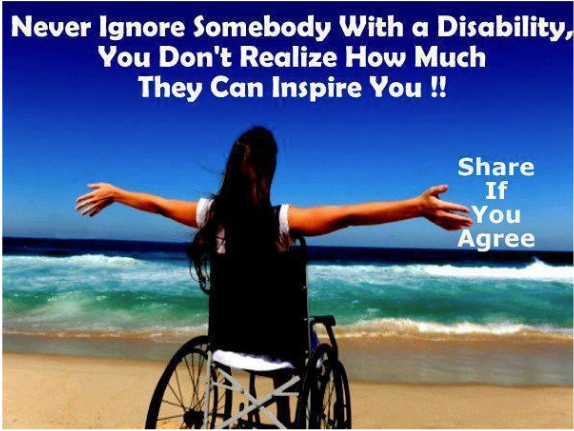“You’re such an inspiration.”
“You’re so brave!”
“You’re so courageous.”
Chances are, if you have a disability, especially a visible one, you’ve probably heard one of these things more times than you can count.
It seems like such a compliment until you break it down to understand why, usually non-disabled, people say this to those with disabilities.
When I was in school, riding the bus regularly, which meant I was out in public, a lot, I heard one of these expressions at least once a day. Strangers would come up to me, especially if I was alone, to congratulate me on leaving my home. These people had no idea who I was, where I was going, or anything else. They were judging my ability to be inspiring on the fact that I use a wheelchair, and happened to be out in the world.
Essentially, the idea of being an inspiration to most non-disabled people, if you are disabled, is embedded in a narrative of pity. The extraordinary things we supposedly do are not extraordinary at all. There’s nothing at all notable about getting out of bed, brushing your teeth, getting on the bus, or any other mundane task humans do every single day. It’s actually quite the opposite. Most people may not realize it, but it’s actually an insult to consider everyday living to be so inspiring. The implication that this is all disabled people are capable of, is equally as problematic. As such, many people with disabilities find the idea of being inspiring incredibly uncomfortable.
It can be hard to pinpoint motives, so a lot of times, people tend to believe that the disability community is overreacting. Our thoughts on the issue are disregarded, and our feelings about being inspirational are often silenced by non-disabled noble intentions. All of this is because our society holds disabled people in such little regard that being able to do anything is deemed an accomplishment. In order to change the idea that disabled lives are automatically inspiring lives, we’re going to have to change the entire narrative of how we view disability in this society. It starts with not pitying us, and that includes redefining what society finds to be inspiring.
I have to admit that people just don’t understand what I mean when I tell them how offensive it is to be called inspiring.”But you are inspiring,” they insist. “We mean it in only the best way!”
I am of the firm belief that most people don’t realize what they are saying, when they say we are inspiring. If only they understood that disability was like any other aspect of life. We adapt, and what is normal to us is just the way things are. People want to imagine a disabled life is a horrible life, so if you can survive that you must have special powers. You must be amazing, and therefore inspiring! Disabled lives are resourceful lives, but that doesn’t necessarily qualify us as being inspirational.
Disabled people, much like non-disabled people, are an eclectic mix. Frankly, I know just as many assholes with disabilities who are doing nothing with their life. There is absolutely nothing inspiring about them (myself included!). At the same time, there are some disabled people who are doing great things. There are disabled performers, lawyers, doctors, scientists. They are making great strides and advancements in the medical world, world of law, and in the greater artistic community. Some might even say what they are doing actually IS inspiring, and they would be right. However, given the history of the word inspiring, it can be hard to point out that someone in our community is making a difference, without making it appear condescending.
The history surrounding being inspirational makes it very hard to acknowledge that disabled people can inspire others. It makes it even harder to admit that it is sometimes okay to be inspired or inspiring.
So how can we separate the idea of actually being inspiring from this long history of condescension and pity that so often accompanies the idea of disabled inspiration? Activists in the disability community have struggled for a long time with this.
Activist, Dana Kline, has proposed using the term cripspiring, especially when disabled people are talking about being inspired by other disabled people. Honestly, I find the term to be criptastic! It has the potential to change the discussion and acknowledge contributions by disabled people, in this world. Of course, there are some disabled people not comfortable with the word crip, and it seems problematic to consider non-disabled people using the term.
I think this is a conversation that has long been overdue in our community. I also think that, as a community, we should work on educating the world on what it truly means to be inspirational. Going out in the community isn’t it. Getting out of bed isn’t it. Actually making a difference in the world can inspire everyone. People with disabilities can do that, and they should be acknowledged for how much hope they give others, when it is clear they have done something truly cripspiring.


[…] THE DAMAGING HISTORY OF BEING CALLED “INSPIRING” […]
I’m not disabled, work for a disability charity and cringe every time I hear the i word. I’ve stopped trying to call it out as it’s so prevalent among people who’ve never considered how patronising and plain stupid it is. But it’s absolutely wrong especially in the context of working to make the world a level playing field for everyone. ‘You’re so inspirational’ essentially means we’ll keep you in your little box so we can feel grateful we’re not like you. A sad world indeed.